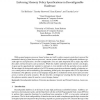Free Online Productivity Tools
i2Speak
i2Symbol
i2OCR
iTex2Img
iWeb2Print
iWeb2Shot
i2Type
iPdf2Split
iPdf2Merge
i2Bopomofo
i2Arabic
i2Style
i2Image
i2PDF
iLatex2Rtf
Sci2ools
113
click to vote
COMPSEC
2008
2008
Enforcing memory policy specifications in reconfigurable hardware
While general-purpose processor based systems are built to enforce memory protection to prevent the unintended sharing of data between processes, current systems built around reconfigurable hardware typically offer no such protection. Several reconfigurable cores are often integrated onto a single chip where they share external resources such as memory. While this enables small form factor and low cost designs, it opens up the opportunity for modules to intercept or even interfere with the operation of one another. We investigate the design and synthesis of a FPGA memory protection mechanism capable of enforcing access control policies and a methodology for translating formal policy descriptions into FPGA enforcement mechanisms. The efficiency of our access language design flow is evaluated in terms of area and cycle time across a variety of security scenarios. We also describe a technique for ensuring that the internal state of the reference monitor cannot be used as a covert storage...
Related Content
| Added | 09 Dec 2010 |
| Updated | 09 Dec 2010 |
| Type | Journal |
| Year | 2008 |
| Where | COMPSEC |
| Authors | Ted Huffmire, Timothy Sherwood, Ryan Kastner, Timothy E. Levin |
Comments (0)

